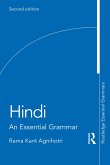- Broschiertes Buch
- Merkliste
- Auf die Merkliste
- Bewerten Bewerten
- Teilen
- Produkt teilen
- Produkterinnerung
- Produkterinnerung
Georgian: A Learner's Grammar is a completely revised and updated guide to the fascinating and most widely spoken language of the Caucasus.
Andere Kunden interessierten sich auch für
![Hindi Hindi]() Rama Kant AgnihotriHindi180,99 €
Rama Kant AgnihotriHindi180,99 €![Hindi Hindi]() Rama Kant AgnihotriHindi40,99 €
Rama Kant AgnihotriHindi40,99 €![Colloquial Yiddish Colloquial Yiddish]() Lily KahnColloquial Yiddish76,99 €
Lily KahnColloquial Yiddish76,99 €![An Introduction to English Grammar An Introduction to English Grammar]() Gerald Nelson (China The Chinese University of Hong Kong)An Introduction to English Grammar46,99 €
Gerald Nelson (China The Chinese University of Hong Kong)An Introduction to English Grammar46,99 €![Spanish Spanish]() Peter T BradleySpanish54,99 €
Peter T BradleySpanish54,99 €![Modern Hebrew Modern Hebrew]() Lewis GlinertModern Hebrew158,99 €
Lewis GlinertModern Hebrew158,99 €![Danish Danish]() Tom Lundskaer-Nielsen (UK University College London)Danish66,99 €
Tom Lundskaer-Nielsen (UK University College London)Danish66,99 €-
-
-
Georgian: A Learner's Grammar is a completely revised and updated guide to the fascinating and most widely spoken language of the Caucasus.
Produktdetails
- Produktdetails
- Routledge Essential Grammars
- Verlag: Taylor & Francis
- Artikelnr. des Verlages: RU27521
- 2. Aufl.
- Seitenzahl: 498
- Erscheinungstermin: 23. Juni 2005
- Englisch
- Abmessung: 234mm x 156mm x 27mm
- Gewicht: 742g
- ISBN-13: 9780415333719
- ISBN-10: 0415333717
- Artikelnr.: 20773919
- Herstellerkennzeichnung
- Libri GmbH
- Europaallee 1
- 36244 Bad Hersfeld
- gpsr@libri.de
- Routledge Essential Grammars
- Verlag: Taylor & Francis
- Artikelnr. des Verlages: RU27521
- 2. Aufl.
- Seitenzahl: 498
- Erscheinungstermin: 23. Juni 2005
- Englisch
- Abmessung: 234mm x 156mm x 27mm
- Gewicht: 742g
- ISBN-13: 9780415333719
- ISBN-10: 0415333717
- Artikelnr.: 20773919
- Herstellerkennzeichnung
- Libri GmbH
- Europaallee 1
- 36244 Bad Hersfeld
- gpsr@libri.de
Born/educated: Doncaster, scholarship in Classics St. John's College Cambridge , Cambridge Linguistics Diploma, MA, Ph.D. (Georgian-Abkhaz syntax). Twice British Council exchange-postgrad (Tbilisi). Linguistics lecturer (Hull); Lecturer (Linguistics/Georgian), Reader & Professor (Caucasian languages) at SOAS (1988-). Fellow of the British Academy (1997). Authored: 'Georgian: A Learner's Grammar' (Routledge), 'Georgian: A Structural Reference Grammar' (Benjamin), 'A Georgian Reader' (SOAS)
Introduction. Lesson 1. Some formal and informal methods of introducing yourself and others The Nominative case of nouns Adjective-agreement with Nominative nouns The formation of adverbs Asking questions (including some formal set-expressions) Some locative expressions The personal pronouns, possessive pronouns and adjectives The Present tense forms of the verbs 'be', 'come/go', 'run', 'be sitting, standing, lying'. Lesson 2. The plural of nouns Dative and Genitive case-forms Adjective-agreement with Datives and Genitives The form of demonstrative adjectives outside the Nominative Directional preverbs Numbers (cardinals and ordinals) How to tell the time Days of the week Months of the year The Present tense of the verbs 'stand up, lie down, sit down' Lesson 3. How to give your age and ask about another's age The comparative and superlative grades of adjectives and adverbs The Instrumental case Adjective-agreement with the Instrumental More of the language's postpositions The past tense of the copula, the basic verb of motion, the stative forms 'be sitting, standing, prostrate' and the dynamic equivalents 'sit down, stand up, lie down' Subject-agreement markers on the verb Lesson 4. The three-way division of the tense-system The marking of subject and object with transitive verbs in the Present (etc.) Word-order The Present Tense of transitive verbs Neutral Version Verb-agreement with 3rd person plural subjects The loss/reduction of -o- in the noun-declension The Adverbial case of nouns Adjective-agreement with nouns in the Adverbial case The postposition -made 'up to' Lesson 5. Subjective Version Indirect Objects Locative Version Indefinite Pronouns and Adverbs Articles Lesson 6. Future of transitive verbs Object-agreement affixes Reflexives Emphatics. Lesson 7. Objective version How to say 'too, also' The emphatic interrogative particle meaning 'pray, on earth!' Relative clauses The potential negative The Vocative case Adjective-agreement for the Vocative Lesson 8. The syntax associated with transitive verbs in Series II The Ergative case of nouns Adjective-agreement with nouns in the Ergative The conjugational patterns for transitive verbs in Series II Lesson 9. Colloquial relative clauses Temporal clauses meaning 'when' Temporal clauses meaning 'while' Manner clauses meaning 'as, like' Temporal clauses meaning 'as soon as' Temporal clauses meaning 'after' Noun-clauses introduced by 'that' Causal clauses meaning 'because, as, since' Simple Conditional clauses The Present Indicative of the verb 'know' Lesson 10. The Present and Future Indicative forms of intransitive verbs The meaning of this type of intransitive verb The syntax of intransitives How to associate indirect objects with intransitive verbs The Future forms of the verbs 'be', 'come/go', 'run', 'be sitting/standing/lying', 'sit down', 'stand up', 'lie down' Lesson 11. The formation of the Aorist Indicative for intransitive verbs The syntax of Aorist Intransitives The Present, Future and Aorist Indicative formations of the Medial verbs The syntax of Medial verbs in Series I and II (Present, Future, and Aorist Indicatives) Verbs whose tenses can be altered through use of a Version vowel Lesson 12. The formation of the Aorist Subjunctive for Transitive, Intransitive and Medial verbs Some uses of the Aorist Subjunctive How to issue an instruction (Imperatives) How to say 'Don't VERB!' (Prohibitions) Lesson 13. The essentials of the so-called Stative Verbs The formation, agreement-patterns and syntax of the so-called Indirect Verbs in the Present, Future and, where relevant, Aorist Indicatives (plus the Aorist Subjunctive) How to say 'X wants to VERB' an
Introduction. Lesson 1. Some formal and informal methods of introducing
yourself and others The Nominative case of nouns Adjective-agreement with
Nominative nouns The formation of adverbs Asking questions (including some
formal set-expressions) Some locative expressions The personal pronouns,
possessive pronouns and adjectives The Present tense forms of the verbs
'be', 'come/go', 'run', 'be sitting, standing, lying'. Lesson 2. The plural
of nouns Dative and Genitive case-forms Adjective-agreement with Datives
and Genitives The form of demonstrative adjectives outside the Nominative
Directional preverbs Numbers (cardinals and ordinals) How to tell the time
Days of the week Months of the year The Present tense of the verbs 'stand
up, lie down, sit down' Lesson 3. How to give your age and ask about
another's age The comparative and superlative grades of adjectives and
adverbs The Instrumental case Adjective-agreement with the Instrumental
More of the language's postpositions The past tense of the copula, the
basic verb of motion, the stative forms 'be sitting, standing, prostrate'
and the dynamic equivalents 'sit down, stand up, lie down'
Subject-agreement markers on the verb Lesson 4. The three-way division of
the tense-system The marking of subject and object with transitive verbs in
the Present (etc.) Word-order The Present Tense of transitive verbs Neutral
Version Verb-agreement with 3rd person plural subjects The loss/reduction
of -o- in the noun-declension The Adverbial case of nouns
Adjective-agreement with nouns in the Adverbial case The postposition -made
'up to' Lesson 5. Subjective Version Indirect Objects Locative Version
Indefinite Pronouns and Adverbs Articles Lesson 6. Future of transitive
verbs Object-agreement affixes Reflexives Emphatics. Lesson 7. Objective
version How to say 'too, also' The emphatic interrogative particle meaning
'pray, on earth!' Relative clauses The potential negative The Vocative case
Adjective-agreement for the Vocative Lesson 8. The syntax associated with
transitive verbs in Series II The Ergative case of nouns
Adjective-agreement with nouns in the Ergative The conjugational patterns
for transitive verbs in Series II Lesson 9. Colloquial relative clauses
Temporal clauses meaning 'when' Temporal clauses meaning 'while' Manner
clauses meaning 'as, like' Temporal clauses meaning 'as soon as' Temporal
clauses meaning 'after' Noun-clauses introduced by 'that' Causal clauses
meaning 'because, as, since' Simple Conditional clauses The Present
Indicative of the verb 'know' Lesson 10. The Present and Future Indicative
forms of intransitive verbs The meaning of this type of intransitive verb
The syntax of intransitives How to associate indirect objects with
intransitive verbs The Future forms of the verbs 'be', 'come/go', 'run',
'be sitting/standing/lying', 'sit down', 'stand up', 'lie down' Lesson 11.
The formation of the Aorist Indicative for intransitive verbs The syntax of
Aorist Intransitives The Present, Future and Aorist Indicative formations
of the Medial verbs The syntax of Medial verbs in Series I and II (Present,
Future, and Aorist Indicatives) Verbs whose tenses can be altered through
use of a Version vowel Lesson 12. The formation of the Aorist Subjunctive
for Transitive, Intransitive and Medial verbs Some uses of the Aorist
Subjunctive How to issue an instruction (Imperatives) How to say 'Don't
VERB!' (Prohibitions) Lesson 13. The essentials of the so-called Stative
Verbs The formation, agreement-patterns and syntax of the so-called
Indirect Verbs in the Present, Future and, where relevant, Aorist
Indicatives (plus the Aorist Subjunctive) How to say 'X wants to VERB' an
yourself and others The Nominative case of nouns Adjective-agreement with
Nominative nouns The formation of adverbs Asking questions (including some
formal set-expressions) Some locative expressions The personal pronouns,
possessive pronouns and adjectives The Present tense forms of the verbs
'be', 'come/go', 'run', 'be sitting, standing, lying'. Lesson 2. The plural
of nouns Dative and Genitive case-forms Adjective-agreement with Datives
and Genitives The form of demonstrative adjectives outside the Nominative
Directional preverbs Numbers (cardinals and ordinals) How to tell the time
Days of the week Months of the year The Present tense of the verbs 'stand
up, lie down, sit down' Lesson 3. How to give your age and ask about
another's age The comparative and superlative grades of adjectives and
adverbs The Instrumental case Adjective-agreement with the Instrumental
More of the language's postpositions The past tense of the copula, the
basic verb of motion, the stative forms 'be sitting, standing, prostrate'
and the dynamic equivalents 'sit down, stand up, lie down'
Subject-agreement markers on the verb Lesson 4. The three-way division of
the tense-system The marking of subject and object with transitive verbs in
the Present (etc.) Word-order The Present Tense of transitive verbs Neutral
Version Verb-agreement with 3rd person plural subjects The loss/reduction
of -o- in the noun-declension The Adverbial case of nouns
Adjective-agreement with nouns in the Adverbial case The postposition -made
'up to' Lesson 5. Subjective Version Indirect Objects Locative Version
Indefinite Pronouns and Adverbs Articles Lesson 6. Future of transitive
verbs Object-agreement affixes Reflexives Emphatics. Lesson 7. Objective
version How to say 'too, also' The emphatic interrogative particle meaning
'pray, on earth!' Relative clauses The potential negative The Vocative case
Adjective-agreement for the Vocative Lesson 8. The syntax associated with
transitive verbs in Series II The Ergative case of nouns
Adjective-agreement with nouns in the Ergative The conjugational patterns
for transitive verbs in Series II Lesson 9. Colloquial relative clauses
Temporal clauses meaning 'when' Temporal clauses meaning 'while' Manner
clauses meaning 'as, like' Temporal clauses meaning 'as soon as' Temporal
clauses meaning 'after' Noun-clauses introduced by 'that' Causal clauses
meaning 'because, as, since' Simple Conditional clauses The Present
Indicative of the verb 'know' Lesson 10. The Present and Future Indicative
forms of intransitive verbs The meaning of this type of intransitive verb
The syntax of intransitives How to associate indirect objects with
intransitive verbs The Future forms of the verbs 'be', 'come/go', 'run',
'be sitting/standing/lying', 'sit down', 'stand up', 'lie down' Lesson 11.
The formation of the Aorist Indicative for intransitive verbs The syntax of
Aorist Intransitives The Present, Future and Aorist Indicative formations
of the Medial verbs The syntax of Medial verbs in Series I and II (Present,
Future, and Aorist Indicatives) Verbs whose tenses can be altered through
use of a Version vowel Lesson 12. The formation of the Aorist Subjunctive
for Transitive, Intransitive and Medial verbs Some uses of the Aorist
Subjunctive How to issue an instruction (Imperatives) How to say 'Don't
VERB!' (Prohibitions) Lesson 13. The essentials of the so-called Stative
Verbs The formation, agreement-patterns and syntax of the so-called
Indirect Verbs in the Present, Future and, where relevant, Aorist
Indicatives (plus the Aorist Subjunctive) How to say 'X wants to VERB' an
Introduction. Lesson 1. Some formal and informal methods of introducing yourself and others The Nominative case of nouns Adjective-agreement with Nominative nouns The formation of adverbs Asking questions (including some formal set-expressions) Some locative expressions The personal pronouns, possessive pronouns and adjectives The Present tense forms of the verbs 'be', 'come/go', 'run', 'be sitting, standing, lying'. Lesson 2. The plural of nouns Dative and Genitive case-forms Adjective-agreement with Datives and Genitives The form of demonstrative adjectives outside the Nominative Directional preverbs Numbers (cardinals and ordinals) How to tell the time Days of the week Months of the year The Present tense of the verbs 'stand up, lie down, sit down' Lesson 3. How to give your age and ask about another's age The comparative and superlative grades of adjectives and adverbs The Instrumental case Adjective-agreement with the Instrumental More of the language's postpositions The past tense of the copula, the basic verb of motion, the stative forms 'be sitting, standing, prostrate' and the dynamic equivalents 'sit down, stand up, lie down' Subject-agreement markers on the verb Lesson 4. The three-way division of the tense-system The marking of subject and object with transitive verbs in the Present (etc.) Word-order The Present Tense of transitive verbs Neutral Version Verb-agreement with 3rd person plural subjects The loss/reduction of -o- in the noun-declension The Adverbial case of nouns Adjective-agreement with nouns in the Adverbial case The postposition -made 'up to' Lesson 5. Subjective Version Indirect Objects Locative Version Indefinite Pronouns and Adverbs Articles Lesson 6. Future of transitive verbs Object-agreement affixes Reflexives Emphatics. Lesson 7. Objective version How to say 'too, also' The emphatic interrogative particle meaning 'pray, on earth!' Relative clauses The potential negative The Vocative case Adjective-agreement for the Vocative Lesson 8. The syntax associated with transitive verbs in Series II The Ergative case of nouns Adjective-agreement with nouns in the Ergative The conjugational patterns for transitive verbs in Series II Lesson 9. Colloquial relative clauses Temporal clauses meaning 'when' Temporal clauses meaning 'while' Manner clauses meaning 'as, like' Temporal clauses meaning 'as soon as' Temporal clauses meaning 'after' Noun-clauses introduced by 'that' Causal clauses meaning 'because, as, since' Simple Conditional clauses The Present Indicative of the verb 'know' Lesson 10. The Present and Future Indicative forms of intransitive verbs The meaning of this type of intransitive verb The syntax of intransitives How to associate indirect objects with intransitive verbs The Future forms of the verbs 'be', 'come/go', 'run', 'be sitting/standing/lying', 'sit down', 'stand up', 'lie down' Lesson 11. The formation of the Aorist Indicative for intransitive verbs The syntax of Aorist Intransitives The Present, Future and Aorist Indicative formations of the Medial verbs The syntax of Medial verbs in Series I and II (Present, Future, and Aorist Indicatives) Verbs whose tenses can be altered through use of a Version vowel Lesson 12. The formation of the Aorist Subjunctive for Transitive, Intransitive and Medial verbs Some uses of the Aorist Subjunctive How to issue an instruction (Imperatives) How to say 'Don't VERB!' (Prohibitions) Lesson 13. The essentials of the so-called Stative Verbs The formation, agreement-patterns and syntax of the so-called Indirect Verbs in the Present, Future and, where relevant, Aorist Indicatives (plus the Aorist Subjunctive) How to say 'X wants to VERB' an
Introduction. Lesson 1. Some formal and informal methods of introducing
yourself and others The Nominative case of nouns Adjective-agreement with
Nominative nouns The formation of adverbs Asking questions (including some
formal set-expressions) Some locative expressions The personal pronouns,
possessive pronouns and adjectives The Present tense forms of the verbs
'be', 'come/go', 'run', 'be sitting, standing, lying'. Lesson 2. The plural
of nouns Dative and Genitive case-forms Adjective-agreement with Datives
and Genitives The form of demonstrative adjectives outside the Nominative
Directional preverbs Numbers (cardinals and ordinals) How to tell the time
Days of the week Months of the year The Present tense of the verbs 'stand
up, lie down, sit down' Lesson 3. How to give your age and ask about
another's age The comparative and superlative grades of adjectives and
adverbs The Instrumental case Adjective-agreement with the Instrumental
More of the language's postpositions The past tense of the copula, the
basic verb of motion, the stative forms 'be sitting, standing, prostrate'
and the dynamic equivalents 'sit down, stand up, lie down'
Subject-agreement markers on the verb Lesson 4. The three-way division of
the tense-system The marking of subject and object with transitive verbs in
the Present (etc.) Word-order The Present Tense of transitive verbs Neutral
Version Verb-agreement with 3rd person plural subjects The loss/reduction
of -o- in the noun-declension The Adverbial case of nouns
Adjective-agreement with nouns in the Adverbial case The postposition -made
'up to' Lesson 5. Subjective Version Indirect Objects Locative Version
Indefinite Pronouns and Adverbs Articles Lesson 6. Future of transitive
verbs Object-agreement affixes Reflexives Emphatics. Lesson 7. Objective
version How to say 'too, also' The emphatic interrogative particle meaning
'pray, on earth!' Relative clauses The potential negative The Vocative case
Adjective-agreement for the Vocative Lesson 8. The syntax associated with
transitive verbs in Series II The Ergative case of nouns
Adjective-agreement with nouns in the Ergative The conjugational patterns
for transitive verbs in Series II Lesson 9. Colloquial relative clauses
Temporal clauses meaning 'when' Temporal clauses meaning 'while' Manner
clauses meaning 'as, like' Temporal clauses meaning 'as soon as' Temporal
clauses meaning 'after' Noun-clauses introduced by 'that' Causal clauses
meaning 'because, as, since' Simple Conditional clauses The Present
Indicative of the verb 'know' Lesson 10. The Present and Future Indicative
forms of intransitive verbs The meaning of this type of intransitive verb
The syntax of intransitives How to associate indirect objects with
intransitive verbs The Future forms of the verbs 'be', 'come/go', 'run',
'be sitting/standing/lying', 'sit down', 'stand up', 'lie down' Lesson 11.
The formation of the Aorist Indicative for intransitive verbs The syntax of
Aorist Intransitives The Present, Future and Aorist Indicative formations
of the Medial verbs The syntax of Medial verbs in Series I and II (Present,
Future, and Aorist Indicatives) Verbs whose tenses can be altered through
use of a Version vowel Lesson 12. The formation of the Aorist Subjunctive
for Transitive, Intransitive and Medial verbs Some uses of the Aorist
Subjunctive How to issue an instruction (Imperatives) How to say 'Don't
VERB!' (Prohibitions) Lesson 13. The essentials of the so-called Stative
Verbs The formation, agreement-patterns and syntax of the so-called
Indirect Verbs in the Present, Future and, where relevant, Aorist
Indicatives (plus the Aorist Subjunctive) How to say 'X wants to VERB' an
yourself and others The Nominative case of nouns Adjective-agreement with
Nominative nouns The formation of adverbs Asking questions (including some
formal set-expressions) Some locative expressions The personal pronouns,
possessive pronouns and adjectives The Present tense forms of the verbs
'be', 'come/go', 'run', 'be sitting, standing, lying'. Lesson 2. The plural
of nouns Dative and Genitive case-forms Adjective-agreement with Datives
and Genitives The form of demonstrative adjectives outside the Nominative
Directional preverbs Numbers (cardinals and ordinals) How to tell the time
Days of the week Months of the year The Present tense of the verbs 'stand
up, lie down, sit down' Lesson 3. How to give your age and ask about
another's age The comparative and superlative grades of adjectives and
adverbs The Instrumental case Adjective-agreement with the Instrumental
More of the language's postpositions The past tense of the copula, the
basic verb of motion, the stative forms 'be sitting, standing, prostrate'
and the dynamic equivalents 'sit down, stand up, lie down'
Subject-agreement markers on the verb Lesson 4. The three-way division of
the tense-system The marking of subject and object with transitive verbs in
the Present (etc.) Word-order The Present Tense of transitive verbs Neutral
Version Verb-agreement with 3rd person plural subjects The loss/reduction
of -o- in the noun-declension The Adverbial case of nouns
Adjective-agreement with nouns in the Adverbial case The postposition -made
'up to' Lesson 5. Subjective Version Indirect Objects Locative Version
Indefinite Pronouns and Adverbs Articles Lesson 6. Future of transitive
verbs Object-agreement affixes Reflexives Emphatics. Lesson 7. Objective
version How to say 'too, also' The emphatic interrogative particle meaning
'pray, on earth!' Relative clauses The potential negative The Vocative case
Adjective-agreement for the Vocative Lesson 8. The syntax associated with
transitive verbs in Series II The Ergative case of nouns
Adjective-agreement with nouns in the Ergative The conjugational patterns
for transitive verbs in Series II Lesson 9. Colloquial relative clauses
Temporal clauses meaning 'when' Temporal clauses meaning 'while' Manner
clauses meaning 'as, like' Temporal clauses meaning 'as soon as' Temporal
clauses meaning 'after' Noun-clauses introduced by 'that' Causal clauses
meaning 'because, as, since' Simple Conditional clauses The Present
Indicative of the verb 'know' Lesson 10. The Present and Future Indicative
forms of intransitive verbs The meaning of this type of intransitive verb
The syntax of intransitives How to associate indirect objects with
intransitive verbs The Future forms of the verbs 'be', 'come/go', 'run',
'be sitting/standing/lying', 'sit down', 'stand up', 'lie down' Lesson 11.
The formation of the Aorist Indicative for intransitive verbs The syntax of
Aorist Intransitives The Present, Future and Aorist Indicative formations
of the Medial verbs The syntax of Medial verbs in Series I and II (Present,
Future, and Aorist Indicatives) Verbs whose tenses can be altered through
use of a Version vowel Lesson 12. The formation of the Aorist Subjunctive
for Transitive, Intransitive and Medial verbs Some uses of the Aorist
Subjunctive How to issue an instruction (Imperatives) How to say 'Don't
VERB!' (Prohibitions) Lesson 13. The essentials of the so-called Stative
Verbs The formation, agreement-patterns and syntax of the so-called
Indirect Verbs in the Present, Future and, where relevant, Aorist
Indicatives (plus the Aorist Subjunctive) How to say 'X wants to VERB' an
'There is no doubt that this book is necessary and unique. It has no serious rival.' -Donald Rayfield, Queen Mary College, University of London, UK
'One must congratulate Hewitt on having provided so much useful information. The emphasis throughout is on the spoken language, with which he has an enviable familiarity.'- The Slavonic Review
'As far as Grammar and similar facts are concerned, George Hewitt's writings are always very reliable.'- Winfried Boeder, University of Oldenburg, Germany
'One must congratulate Hewitt on having provided so much useful information. The emphasis throughout is on the spoken language, with which he has an enviable familiarity.'- The Slavonic Review
'As far as Grammar and similar facts are concerned, George Hewitt's writings are always very reliable.'- Winfried Boeder, University of Oldenburg, Germany
'There is no doubt that this book is necessary and unique. It has no serious rival.' -Donald Rayfield, Queen Mary College, University of London, UK
'One must congratulate Hewitt on having provided so much useful information. The emphasis throughout is on the spoken language, with which he has an enviable familiarity.'- The Slavonic Review
'As far as Grammar and similar facts are concerned, George Hewitt's writings are always very reliable.'- Winfried Boeder, University of Oldenburg, Germany
'One must congratulate Hewitt on having provided so much useful information. The emphasis throughout is on the spoken language, with which he has an enviable familiarity.'- The Slavonic Review
'As far as Grammar and similar facts are concerned, George Hewitt's writings are always very reliable.'- Winfried Boeder, University of Oldenburg, Germany








